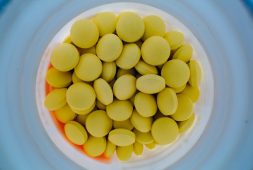
About 90 percent of participants experienced a minimum 5 percent reduction in their body weight over the 68-week trial using Wegovy, as reported by the manufacturer. Novo Nordisk intends to request FDA approval for a daily semaglutide pill before the conclusion of 2023.
Unpublished findings from a late-stage study by pharmaceutical company Novo Nordisk suggest that the weight loss medication Wegovy, currently available in weekly injection form, might be equally effective in the form of a daily pill.
In the phase 3 trial, 667 adults dealing with overweight or obesity were randomly divided into groups to receive a placebo or a 50 milligram (mg) semaglutide tablet – the active ingredient in Wegovy – once a day for 68 weeks. The study revealed that patients using Wegovy lost 15.1 percent of their body weight, while those on the placebo only experienced a 2.4 percent reduction.
According to Martin Holst Lange, the Executive Vice President for Development at Novo Nordisk, these outcomes align with the weight loss achieved through weekly Wegovy injections. This statement was made on May 22 when he announced the study results for the tablet form of the drug.
Wegovy Pill Availability
Novo Nordisk has announced its intention to pursue regulatory clearance in the United States and Europe for a tablet variant of Wegovy before 2023 concludes. Should the U.S. Food and Drug Administration (FDA) grant approval for this tablet option, individuals would subsequently have the opportunity to select either a pill or an injection, both of which yield comparable outcomes in terms of weight loss, as stated by Holst Lange.
“The choice between a daily tablet or weekly injection for obesity has the potential to offer patients and healthcare providers the opportunity to choose what best suits individual treatment preferences,” he said.
The new tablet yielded even more remarkable weight loss outcomes when focusing solely on participants who diligently adhered to their medication regimen throughout the entire study, as revealed by researchers. According to Novo Nordisk, these committed patients attained an impressive average weight reduction of 17.4 percent, with a notable 89.2 percent of them successfully shedding at least 5 percent of their body weight.
Novo Nordisk reported that the predominant side effects experienced were mild to moderate gastrointestinal discomfort. It’s important to note that the results shared by the company have not yet undergone publication in a medical journal, a customary process involving evaluation by independent experts.
All About GLP-1 Receptor Agonists
In a previous examination of Wegovy injections, which was published on March 18, 2021, in the New England Journal of Medicine, it was observed that adults dealing with overweight or obesity experienced an average weight reduction of 14.9 percent over a span of 68 weeks.
The active component of Wegovy, known as semaglutide, belongs to a category of medications referred to as GLP-1 receptor agonists. These medications contribute to weight loss by promoting sensations of fullness and diminishing feelings of hunger. Additionally, they assist individuals in managing diabetes by facilitating the body’s insulin production and utilization—a crucial hormone responsible for regulating blood sugar levels.
Novo Nordisk presently offers a tablet form of semaglutide called Rybelsus, intended to lower blood sugar among individuals with type 2 diabetes. However, Rybelsus is associated with a potential risk of thyroid cancer and can only be taken when the stomach is empty. Furthermore, the highest available dosage of Rybelsus is 14 mg, which falls significantly below the dosage required to achieve the weight loss outcomes documented in the recent study.
Other Up and Coming Diabetes and Weight Loss Drugs
Pfizer is in the process of developing another GLP-1 drug named danuglipron, which is intended to compete with Ozempic. However, the company still needs to carry out additional clinical trials before it can be fully established.
The findings of a 16-week study, published on May 22 in JAMA Network Open, reveal that individuals who were administered 80 or 120 mg of danuglipron twice a day experienced weight loss of up to 10 pounds more than those who were given a placebo. Among the participants taking the highest dosage of danuglipron, nearly half of them managed to lose at least 5 percent of their body weight. It’s important to note that lower doses of the drug did not result in statistically significant weight loss for the patients.



